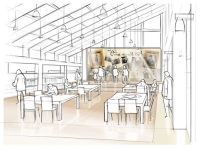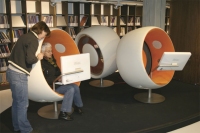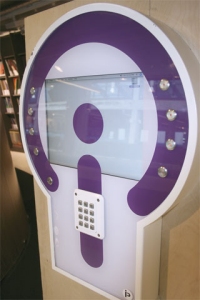 |
This rendering of the soon-to-be-ready DOK Agora, or ‘storyboard of your life’ project, illustrates how your grandmother’s (‘Oma’ in Dutch) birthday celebration might be displayed.
[Click for full-size image] |
 |
These cool multimedia chairs provide the ultimate music and film experience.
[Click for full-size image] |
 |
Dutch patrons can use these Tank U stations to download Bluetooth content to their phones so they can enjoy it whenever they like.
[Click for full-size image] |
|
In the Netherlands, in Delft, a medium-sized town (100,000) just a little below sea level (famous for the Girl with the Pearl Earring painting and the blue pottery known as Delftware), stands a library that at first glance may appear to be just a regular public library, but how special it is! DOK can best be described as a media center that combines three unique collections: Music and Film (“Discotake” in Dutch), Literature (“Openbare Bibliotheek”), and Art (“Kunstcentrum”). These three components make DOK much more than an ordinary library. The outstanding collections, together with the expertise of the staff, are the basis for the flow of creativity and energy that inspires the inhabitants of Delft. Together with two other branch libraries, DOK Tanthof and DOK Voorhof, DOK serves 80% of the population. It is the most frequently visited public institute in Delft. More than 500,000 people annually visit DOK, and every kid at school is a member. The motto “Borrow the World in Delft” truly sums it up and makes DOK an easily accessible cultural information center.
I’ve been working in the communication and innovation department here at DOK for 3 years now, and I’m deeply involved in many of our outreach activities. In this article, I’ll explain the way we view DOK’s mission, and I’ll introduce you to some of the innovative projects we’ve done, such as taking mobile film studios to schools and letting people download content via Bluetooth applications.
DOK’s Mission in the Changing World
The mission of DOK is to become and remain the most advanced library in the world. Using creativity, technical innovation, and advancing scientific understanding, DOK endeavors to be an indispensable source of inspiration for its members, visitors, and partners in the city of Delft, in the Netherlands, and in the world. In this way, DOK hopes to safeguard access to the independent, objective, free flow of information that is essential for democracy now and in the future.
DOK’s vision of the future is not an inward view of the organization. It is based on DOK’s position in relation to surroundings relevant for the future that are important to DOK and Delft. Society is changing rapidly. Communication is faster and easier than ever. The migration of people and the growing population make society more complex. The web makes boundaries and walls disappear, and time and distance are less important. Information is available 24/7 on different media, search engines, chat sites, and peer-to-peer networks. In fact, there are more cell phones in the Netherlands than there are inhabitants.
People often have several digital identities that give them access to their own digital domain. We are faced with more questions than answers, and no matter how clever the search engines may be, this offers opportunities to libraries.
Keep, Make, and Foremost, Share Stories
Well, that sounds good, but what makes DOK a “library concept center”? The first thing we had to let go of when the three collections merged into DOK in 1996 was the idea that the medium we lend out determines what we are. What does it matter whether we share our stories in the form of a book, a CD, a DVD, an MP3 player or MP3 file, or a work of art? We can expect that the world of our children’s children will be completely different. Perhaps books will be treasured in museums or at home, but the library may only have digital information carriers. What we do know is that people will always want, love, and need stories. That is why we work on preserving stories by digitizing collections (Images for the Future), creating stories by sending our Shanachies out into the world to find best practices in libraries, and giving people a platform to tell their stories in the library (the DOK Agora project). DOK always tries to be one step ahead. If there is a Library 2.0, then DOK will be 3.0.
The management at DOK believes it is of paramount importance to look beyond walls and borders in order to keep up with developments worldwide and thus to maintain its high level of service to the customers. One good example of how we’ve done this is a project we called the Shanachie Tour 2007. The word “Shanachie” comes from Ireland and is the name for the old-time storyteller. This man was highly regarded and traveled around Ireland telling stories in exchange for food and lodging. In this manner, three librarians (including me) set out last fall to cross the U.S.A. in 3 weeks. We traveled 5,000 miles in an RV, gathering and telling stories, making many new friends, and exchanging valuable ideas. We captured the whole trip on video and in a blog with beautiful pictures at www.shanachietour.com.
Reactions to the tour were amazing. Seeing how strongly we believed in the importance of libraries and librarians inspired many people. Sharing the beauty and results of hard, passionate work like this is so important. DOK believes in a global library network that will help us maintain our important position in society and create a solid base for democracy. (The money for this project came from external funding and sponsors who share this belief and are willing to invest in the library of the future.)
The Library as a Story Publisher
In order to be able to keep, make, and share stories in this day and age, when rights and privacy are the subject of debate, DOK thinks it is essential that librarians start to think about publishing their own content. That is why a number of our projects deal with this issue.
One of the biggest projects we’re working on is DOK Agora, “the storyboard of your life.” On huge screens in the library, it is possible to present an exhibition of whatever you, as a patron, think is important and of value to the community. Imagine that your grandmother is about to celebrate her 85th birthday. Wouldn’t it be great to make an exhibition of her life and show it in the library? A camera crew will interview relatives and friends. They will go to the places where she lived and worked. The final presentation will contain the music and art she loves in a cross-media tribute to a person, a time, and a city. People in the library will see this, recognize things, talk about their own memories, and share their stories. It is a great way of promoting social cohesion.
Another project that is related to this (in more than one way) is DOK Studio. With a considerable grant from a national library innovation fund, DOK was able to buy equipment for a mobile studio, with cameras, sound systems, editing programs, and everything else needed to make documentaries and do videocasts for the website. With this mobile studio, DOK employees visit high schools, allowing students to film their stories or, for instance, a campaign against alcohol abuse among teenagers. This places DOK in the middle of society and gives a boost to the image the teens have of the library. When working in the mobile studio, they find it is great fun to write scripts, read storyboards, and search for music soundtracks to add to the filmed material. DOK Studio has proven to be a successful way of bringing the teens back to the library.
Getting More Serious About Gaming
One of the documentaries the DOK crew made was “If You’re Not Gaming, You’re Losing.” We shot most of the material for this in the Chicago area. We stayed a week with social networker Michael Stephens and had the chance to spend precious time with him and gaming advocate Jenny Levine. We found there are a number of libraries that pay a lot of attention to their teens and that actively promote gaming. It became clear that these libraries attract a significantly higher number of teenagers, and we learned that the book circulation among these teens is up 70%. This was a lesson not to be ignored. When we got home, we put the video on our website (www.dok.info/index.php?cat=home&video_id=63) and spoke at a library conference about our experiences. And now, a year later, we already see an increasing number of librarians in the Netherlands who buy gaming consoles for the kids to play on.
This is great, of course, but it’s not enough. DOK decided to take the whole gaming idea one step further. Together with Delft University of Technology, DOK workers came up with the plan to hold a national conference (www.ugame-ulearn.com) about the role of gaming in education and new literacy. International speakers will come to Delft this March to discuss questions like “How does gaming help in acquiring skills needed for the future?” Besides the conference, there will be a number of game parties in both DOK and the university library. Also, in the period between January and July 2008, students from different educational backgrounds will be working on making a computer game. This game will, of course, have everything to do with libraries and stories.
Thinking and Acting Beyond Library Walls
Cooperation and guts may be the keys to the success of the unusual ventures we undertake here at DOK. Don’t think budgets; think ideas and think beyond the library walls. Together with many partners, we are able to come up with new services or better ways to present the library to the people. A good example of this is the Tank U, a download station that uses Bluetooth. Content that our librarians select, such as a library magazine, an agenda of activities, or an audio book, can be installed onto these Tank stations, which can then be placed in different locations outside the library. Think of the promotional possibilities when you place the Tank U in railway stations, hospitals, cinemas, theaters, and so on. People with Bluetooth applications on their cell phones can download content to their phones and play it on the train or wherever they want. Once their interest is aroused, they are sure to come and visit the library.
Together with Octopus, a children’s daycare center, DOK organizes a summer camp. The idea for this camp came when we first realized that the library of the future needs to think beyond walls and reach out to the people. What better means to do this than through a summer camp for children? While playing in the country and having lots of fun, the children learn how to make a newspaper or a television show or how to become an “idol” (as in the American Idol TV show), with workshops in singing, acting, and dancing.
Librarians of the 21st Century
With all of these changes and new services, it is obvious that the librarians of the 21st century are faced with challenges. New skills are required and changes in the organization may be necessary. The librarians of today are the media guides of tomorrow. They will help people navigate through the abundance of information and tell them about the new technology that is coming on the market and how to use it. It is obvious that the job of the librarian is one that involves lifelong learning. To keep a clear view, DOK deploys a number of account managers. So in the organization of DOK, you find project managers, content managers, and in-store marketing managers. This has proven to be the best way of making crossover use of the different collections, thereby realizing an increase in circulation numbers and revenue as people take out more materials (books, CDs, DVDs, and art, some of which they pay a small amount to borrow).
The fact that our old library building had become too small and had to be demolished to make way for houses gave us the chance to think of new ways of designing our library. The new building that opened on May 21, 2007, is an inspiration to both staff and visitors. We had always been on the lookout for new ideas, but then we had the budget and the opportunity to put in a number of innovative gadgets, such as our music chairs. In a sort of 1970s design, these iPod chairs, with speakers all around and a seat that moves on its base, provide an entirely new music experience while it is also possible to watch a movie on the big screens. Staff members can update the Macs whenever they want, so there are always new music and films to discover.
Besides the cool chairs, we have the Nintendo Wii and the PlayStation consoles. Both adults and children use them all day long. Our bookcases in the youth department are mounted on casters so we can roll them aside for activities. The Coffee Corner provides a good lunch and excellent coffee and tea. There are lectures, readings, and musical performances almost every week, and people like to spend a few hours in the library. Wi-Fi also makes DOK appealing to students to come and study. The art department holds regular exhibitions.
All of this together makes DOK the place to be and the club people want to be a member of. In the end, this is what it all comes down to. When the people, the most important collection of the library, are happy, the library has a future. At this moment, DOK is already working on new website applications and new marketing tools. So be on the lookout and check www.dok.info. Keep sharing ideas, and help us to make the future a global library experience.
|